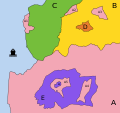File:Enclave exclave diagram.svg
Appearance

Size of this PNG preview of this SVG file: 640 × 600 pixels. Other resolutions: 256 × 240 pixels | 819 × 768 pixels | 1,092 × 1,024 pixels | 2,185 × 2,048 pixels | 1,600 × 1,500 pixels.
Original file (SVG file, nominally 1,600 × 1,500 pixels, file size: 81 KB)
File history
Click on a date/time to view the file as it appeared at that time.
| Date/Time | Thumbnail | Dimensions | User | Comment | |
|---|---|---|---|---|---|
| current | 05:31, 31 January 2024 |  | 1,600 × 1,500 (81 KB) | WinTakeAll | Uploaded a work by Gazilion from https://commons.wikimedia.org/wiki/File:Diagrama_enclave_exclave.svg with UploadWizard |
File usage
The following page uses this file:
Global file usage
The following other wikis use this file:
- Usage on ast.wikipedia.org
- Usage on fa.wikipedia.org
- Usage on hy.wikipedia.org
- Usage on id.wikipedia.org
- Usage on pt.wikipedia.org
- Usage on vi.wikipedia.org
